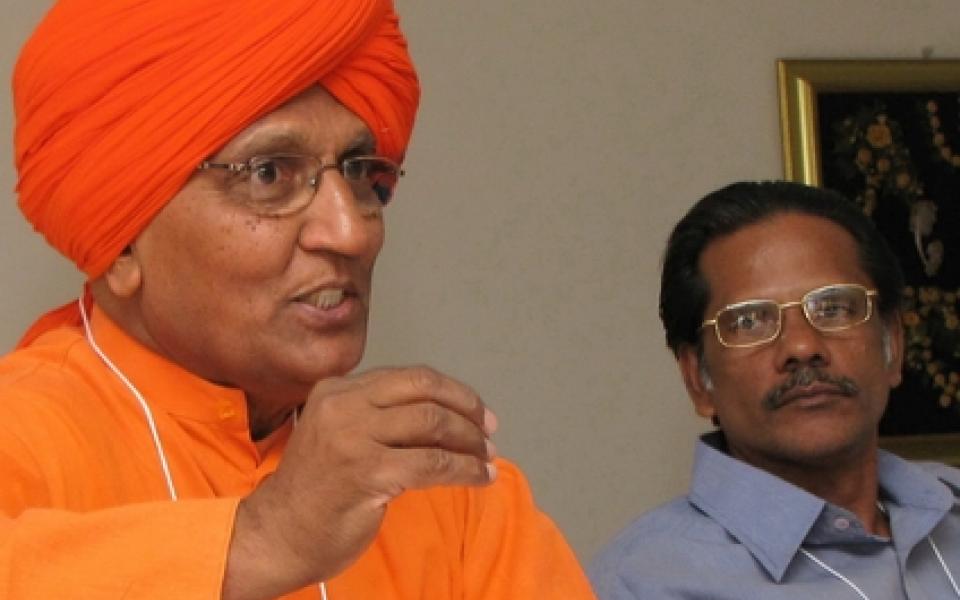
Swami Agnivesh (left) with Abraham Karickam, URI Regional Coordinator for South India, at a URI Global Council meeting in Amman, Jordan in 2010.
Less than a year after his campaign for peace talks between Maoist rebels and the Indian government collapsed, social activist and URI Global Council Trustee Swami Agnivesh is at it again. Buoyed by his recent success in negotiating the release of five hostages in Chhattisgarh State, Agnivesh, a prominent Hindu leader, is pressing the Indian government to halt its military operations and come to the table.
Seventy-one year-old Agnivesh, easily recognized by the saffron garb he wears as a symbol of sacrifice, has gained a name for himself in India and globally by taking on such thorny social, political and economic issues as bonded and child labor, female feticide, women’s empowerment and more. He is co-founder of URI’s Religions for Social Justice Cooperation Circle, and became a URI Trustee for Asia in 2009.
“I feel imbued by the URI spirit in my work for peace, justice and reconciliation,” he wrote in a recent email.
His first peace initiative resulted in an agreement by the government to cease hostilities for 72 hours and begin talks if the Maoists agreed to do the same. It was derailed when the Maoist spokesman carrying the government’s offer was assassinated, allegedly at the hands of the state. Since then, Maoist activity has spiked in several areas and the government offensive has continued unabated.
In an article for India’s progressive Tehelka magazine, Agnivesh described the hostage release in Chhattasgarh as “a potent moment because it shows the Maoists are willing to trust despite having been betrayed, despite their leader having to pay with his life for trusting a peace initiative.”
The five hostages, Chhattisgarh policemen involved in an anti-Maoist operation, had been held for 18 days in a remote Maoist village in Narayanpur district. Agnivesh, a team of human rights activists and family members of the hostages trekked 10km into the forest to receive them and meet with their abductors.
“After myriad wrong turns and several delays, I was unsure whether we would ever come upon that fateful clearing in the forest,” wrote Agnivesh. “I felt both delight and relief when I found the Maoists had kept their word.”
While the freed policemen reconnected with their families, Agnivesh and his group met with the Maoist commander, and Agnivesh offered to renew his efforts to facilitate peace talks.
At a joint press conference the next day, Chhattisgarh Chief Minister Raman Singh—known for his hard line against the Maoists—agreed to lobby for new peace talks with India’s Home Minister, P Chidambaram, saying “The bullet is not an answer to any problem.”
Agnivesh is now seeking an appointment with Prime Minister Manmohan Singh, and has continued his mediation work by helping with the release of a district collector and a junior engineer who were abducted by Maoists in Orissa state in mid-February.
Articles of interest:
Swami Agnivesh and friends meet the comrades
Agnivesh Rama talk peace after policemen released
Swami Agnivesh opens talks for IAS officer’s release with Maoists
